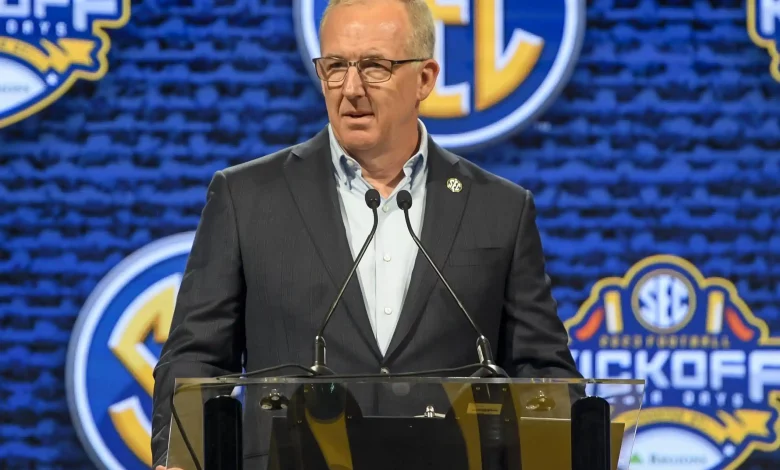Greg Sankey Should Consider Expelling Tennessee Volunteers from the SEC: A Call for Accountability and Leadership

In the high-stakes world of college athletics, conferences like the SEC are expected to uphold not only the competitive integrity of the games but also the values that define collegiate sportsmanship and responsibility. Greg Sankey, the Commissioner of the SEC, has held a key role in shaping the culture of college athletics, maintaining the balance between competition, fairness, and ethical conduct. However, recent controversies surrounding the Tennessee Volunteers, particularly those involving their football program, have raised significant questions about accountability within the SEC. This has led to some debating whether it is time for Sankey to take a strong stand against Tennessee’s actions and, perhaps, expel them from the conference altogether.
The Importance of Integrity in College Sports
College sports have always been a crucible for young athletes to develop both on and off the field. College programs, particularly those in premier conferences like the SEC, have an obligation to nurture student-athletes, foster fair competition, and ensure that all programs adhere to the ethical standards established by the NCAA. However, when schools, coaches, or athletic departments violate these standards, it erodes the very foundation of collegiate athletics.
For years, the SEC has prided itself on a culture of integrity, competition, and excellence. Schools like Alabama, Georgia, LSU, and Tennessee have historically represented the best in college football, but these programs must abide by the rules that govern fair play. When these programs breach that trust—whether through recruitment violations, unethical behavior, or other controversies—it’s up to the leadership of the SEC to step in and maintain the conference’s reputation.
The Tennessee Volunteers Controversy
While Tennessee has a rich history in college football, it is no stranger to controversy. Over the years, the program has faced various issues, including coaching changes, off-the-field scandals, and disputes over NCAA violations. The program’s most recent issues have raised significant concerns, casting a long shadow over their current and future role within the SEC.
The Tennessee Volunteers’ football program has found itself in hot water for various reasons in recent years. Whether it’s been a lack of adherence to NCAA regulations, coaching misconduct, or recruiting violations, these issues continue to plague the team. While some might argue that these are merely the mistakes of individual players or coaches, the fact remains that they reflect poorly on the institution as a whole. Tennessee’s inability to resolve these problems and maintain a clean image raises the question of whether such behavior should be tolerated by the SEC.
In particular, the aftermath of Tennessee’s hiring of head coach Jeremy Pruitt was marked by a series of controversial decisions that negatively impacted the program. Pruitt was fired for NCAA violations, and subsequent investigations revealed the involvement of assistant coaches and other staff members. This level of misconduct has cast a long-lasting shadow over the university’s reputation. As a result, many are now asking whether Tennessee’s presence in the SEC undermines the values that Sankey and the conference seek to promote.
The Role of SEC Leadership
As Commissioner of the SEC, Greg Sankey has the responsibility of protecting the integrity and reputation of the conference. When member schools fail to live up to the standards expected of them, it falls to Sankey to take appropriate action. The SEC has long been known for its competitive excellence, and part of that excellence stems from the ethical leadership that governs its members.
Sankey has already shown that he is willing to make bold decisions when necessary. He played a pivotal role in managing the challenges posed by the COVID-19 pandemic, working with school administrators to ensure that games were played safely and that the conference remained a leader in college football. However, when it comes to schools like Tennessee that appear to repeatedly undermine the integrity of college sports, Sankey may need to take even stronger measures.
Should Tennessee Be Expelled from the SEC?
Expelling a program from a major conference is an extreme and unprecedented step. However, in light of Tennessee’s repeated failures to live up to the SEC’s standards, it may be a conversation worth having. The primary issue here is not necessarily Tennessee’s on-field performance but the consistent pattern of off-field issues that threaten the conference’s reputation.
When schools like Tennessee fail to address internal issues—whether those issues stem from coaching misconduct, recruitment violations, or failure to comply with NCAA regulations—it becomes increasingly difficult for the conference to continue to support them. By expelling a school like Tennessee, Sankey would be sending a clear message to other SEC programs: integrity and accountability are non-negotiable. It would also send a broader message to college sports as a whole that the SEC is not just a competitive conference, but a conference that stands firm in its commitment to fairness and ethical conduct.
Moreover, Tennessee’s inability to recover from past scandals and to maintain a clean reputation makes it harder for the program to function as a respected member of the SEC. The continual off-the-field distractions surrounding the Volunteers only serve to detract from the conference’s credibility. With other SEC schools operating with a sense of responsibility and commitment to excellence, the last thing the conference needs is to continue tolerating a school that disrupts that balance.
A History of Accountability
If we look at the broader history of college sports, we can see that programs have been expelled or banned from conferences due to repeated unethical behavior. The SEC, in particular, has had instances where it made tough decisions to ensure the integrity of the conference. While expelling a program like Tennessee would be a drastic move, it would not be entirely out of character for the SEC, which has shown time and again that it values long-term success and stability over short-term benefits.
For example, in the past, schools that violated NCAA rules or were embroiled in scandals were often given harsh sanctions, including bans from postseason play or the loss of scholarships. These measures were designed to send a clear message that unethical behavior would not be tolerated. If Tennessee continues to fail to clean up its act, there may come a point where expulsion is the only way to restore the conference’s reputation.
What Would Expulsion Mean for Tennessee and the SEC?
Expelling Tennessee from the SEC would have massive implications for both the school and the conference. For Tennessee, it would be a devastating blow to the football program, which would lose the opportunity to compete in one of the most prestigious conferences in college sports. The school would have to seek out a new conference affiliation, which could dramatically affect its recruiting efforts, television revenue, and overall reputation.
For the SEC, expelling Tennessee would serve as an example of the conference’s commitment to accountability. It would also signal to other schools that the SEC is serious about maintaining the integrity of its programs. While it would undoubtedly be a controversial move, the long-term benefits of taking a stand against unethical behavior would be clear. The SEC would reaffirm its status as the top college football conference in the country, with an unwavering commitment to excellence both on and off the field.
In the world of college sports, leadership is key. As the head of the SEC, Greg Sankey has the opportunity to set a precedent for how conferences should deal with issues of ethics, accountability, and integrity. Expelling Tennessee from the SEC is a drastic measure, but one that could ultimately prove necessary to protect the values of the conference and the future of college football.
While Tennessee’s football program has the potential to recover and rebuild, it is clear that the SEC cannot afford to let its reputation be compromised by one of its own. It is time for Sankey to take a bold step and send a message to the entire college sports world that accountability must come first.









